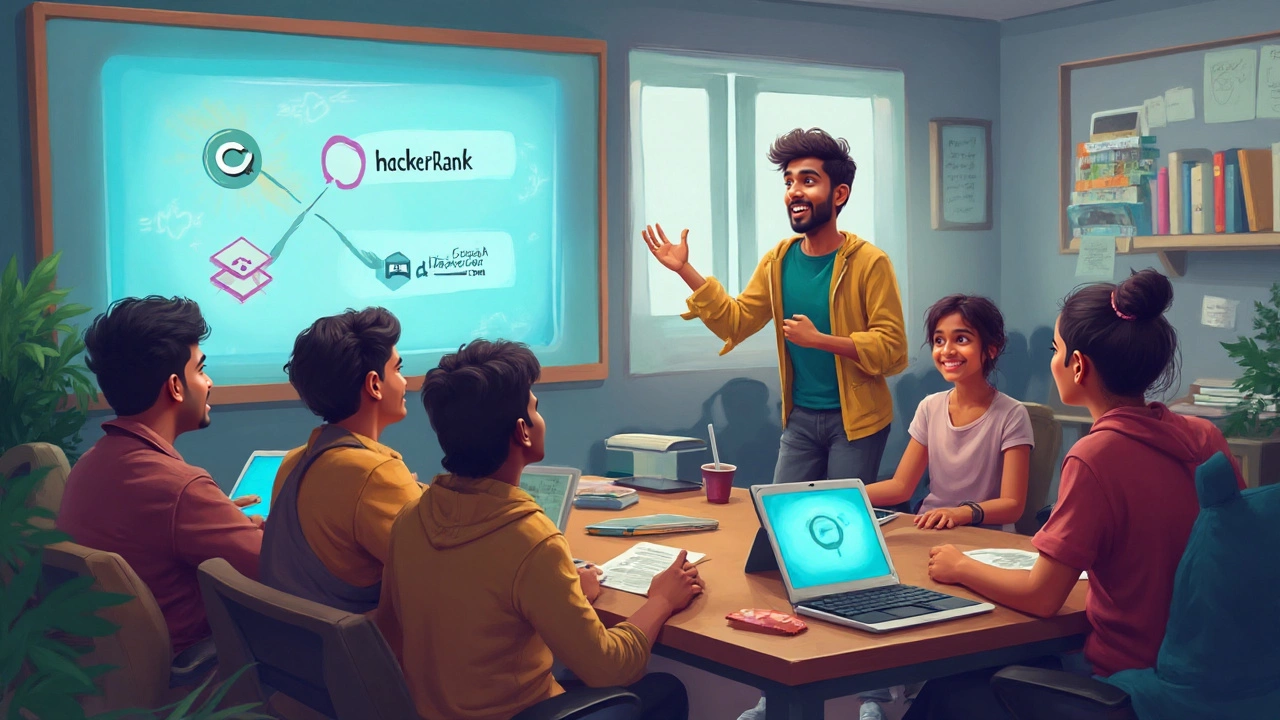So you want to learn coding but don’t know where to begin? You’re not alone. Believe it or not, people from Durban to Dubai are asking the same question every day. Coding isn’t just for computer geeks anymore—now, kids, parents, even grandmas are jumping on the bandwagon. The usual advice? Try some free sites or sign up for a fancy bootcamp. But it’s easy to get overwhelmed by all the options. One minute, you’re looking at YouTube tutorials; next, you’re lost in a rabbit hole of JavaScript libraries. The real secret? It matters less where you start and more that you actually start somewhere that works for you.
The First Step: Finding Your Why
Before you start clicking "sign up" on every coding website you see, spend a little time figuring out why you want to learn to code. Are you hoping to build an app, land a tech job, automate boring tasks, or just scratch that curiosity itch? The answer isn’t just a feel-good exercise. It’ll help you choose the right platform and avoid wasting time (and money) jumping between tools.
Think about it: learning Python to build a side hustle is a whole different ballgame from trying to crack into Silicon Valley’s developer scene. If job hunting is the goal, you’ll want more structure—a course with projects, maybe even a certificate at the end. If your big dream is to automate spreadsheets at work, you don’t have to go deep into algorithms right away. If you just want to see what the fuss is about, try something beginner-friendly and free, so you aren’t stuck in a commitment you’ll regret in two weeks.
The good news? The internet is loaded with places to learn, and many are tailored for total newbies. But first, take five minutes to jot down your main goal, your preferred learning style (video, hands-on, reading?), and how much time per week you can honestly put in. This tiny planning step will pay off big time when you’re sorting through all your options.
Breaking Down Your Options: Online, In-Person, or DIY?
Now, let’s talk about the menu. Most new coders ask: is it better to learn online, in a classroom, or by teaching myself? It’s like choosing between gym memberships, home workouts, or running outside—each path fits a different crowd.
Online Courses and Platforms are easily the most popular route right now. The big names like Codecademy, freeCodeCamp, and Coursera offer beginner-friendly paths, often with interactive lessons where you type code directly into your browser. According to a recent report by Class Central in 2025, more than 80 million learners tried online coding courses globally last year, with freeCodeCamp alone accounting for 15 million of those sign-ups.
- Codecademy: Known for its simple, gamified interface and immediate feedback. Offers free basic lessons and paid pro plans with quizzes and projects.
- freeCodeCamp: Completely free, project-based, and includes a whopping 3,000+ hours of content. Great if you love building real projects as you learn.
- Coursera & edX: Partner with top universities and often give you more structured, in-depth content, sometimes led by actual professors.
- Khan Academy: Packed with simple, visual tutorials and great for kids or nervous adults. Teaches the basics of JavaScript and web development.
But maybe you’re not a fan of staring at a screen alone. Some beginners love in-person classes or coding bootcamps, which are more social and usually more intense. Think of bootcamps like a crash course—you dive in for 8-12 weeks, work on real-world projects, and hopefully come out job-ready. Le Wagon, General Assembly, and HyperionDev (which has a base in Johannesburg) are a few options you’ll find here in South Africa. They aren’t cheap, but for folks who need discipline and face-to-face help, nothing beats sitting next to someone who can walk you through a bug. Recent surveys show that 79% of bootcamp grads land a related job within six months of finishing.
Last up: the DIY crowd. If you’re super motivated, you could try piecing together your education with free YouTube channels (Traversy Media, The Net Ninja, or Academind), coding blogs, and practice site like LeetCode or HackerRank. This path is flexible—you choose what you want, when you want. But you also have to keep yourself accountable, or risk drifting off into procrastination land. I’ve seen people here in Durban make huge progress just by following free online roadmaps (like roadmap.sh or freeCodeCamp’s curriculum) and practicing every night.

Choosing the Right Beginner Coding Platform
Let’s get practical. You don’t need to test-drive every coding site online. Here’s a handy breakdown table showing the key platforms, what they’re best at, and what you might like or dislike about each.
| Platform | Best For | Cost | Main Languages | Features |
|---|---|---|---|---|
| freeCodeCamp | Project-based learners, self-starters | Free | HTML, CSS, JS, Python | Free certifications, interactive challenges, real projects |
| Codecademy | Absolute beginners | Free / Paid Pro | JS, Python, HTML/CSS, Java | Hands-on tutorials, quizzes, career paths |
| Coursera | University-structured learners | Free / Paid Certificate | Python, Java, C++ | University-led, get certificates, peer help |
| Khan Academy | Visual learners, kids | Free | JS, HTML, ProcessingJS | Animations, simple exercises, practice problems |
| Le Wagon (Bootcamp) | Career-changers | Paid | Ruby, JS | Intensive, in-person, job-focused |
If you just want to get your feet wet, stick to freeCodeCamp or Codecademy’s free lessons. You’ll do best with platforms that let you write real code in the browser, rather than just watch videos or read text. Want to learn with others and maybe land a job fast? Bootcamps like HyperionDev or Le Wagon are worth checking out—just be ready for the time commitment. But if you’re teaching yourself, don’t skip the power of regular practice and joining communities on Discord or Reddit. You’d be surprised how much faster you learn with a little help from others making the same mistakes.
Keep Going: Turning Lessons Into Real Skills
Let’s not sugarcoat it: starting is easy, but sticking with coding is tough. More than half of beginners drop off within a month. Why? They chase shiny new topics, lose focus, or get frustrated when things don’t “just work.” Sound familiar?
To actually get good at coding, you need to build habits—not just watch lessons or copy code. Here are practical tips that make a real difference:
- Set a regular coding schedule, even if it’s only 20 minutes a day. Cramming for hours once a week is less effective than practicing a little every day.
- Don’t just read—type out the code yourself. It sounds simple, but active practice helps your brain remember a lot better.
- Start tiny projects quickly. Don’t wait until you “feel ready.” Even a simple calculator, to-do list, or personal website is better than nothing.
- Check out community projects. Participate in beginner hackathons or join free open source projects on GitHub. You’ll find real motivation (and make new friends).
- When you get stuck—and you will!—ask for help. The r/learnprogramming subreddit, Stack Overflow, and Discord coding servers are filled with patient folks helping newbies out daily.
- If a lesson or project feels boring, switch it up. Try another language or build something just for fun, like a silly game or a chatbot that cracks jokes.
- Track your progress. Check off lessons, share your work online, or blog about what you built. Each small win keeps you moving forward.
Remember, employers and freelance clients care more about what you can make than what certificates you have. Stack your portfolio with actual things you’ve coded, like websites you made for a local business or Python scripts that solved your own problems. That’s way more powerful than just listing course names.
And don’t sweat it if you hit walls. Some of the best programmers I know started out thinking they’d never “get it.” Turns out, the only difference with folks who actually get hired is that they kept going after the tough days. So pick your learning path, stay curious, and keep hacking away. Before you know it, you’ll be the one giving advice to the next crop of beginners just getting started.

